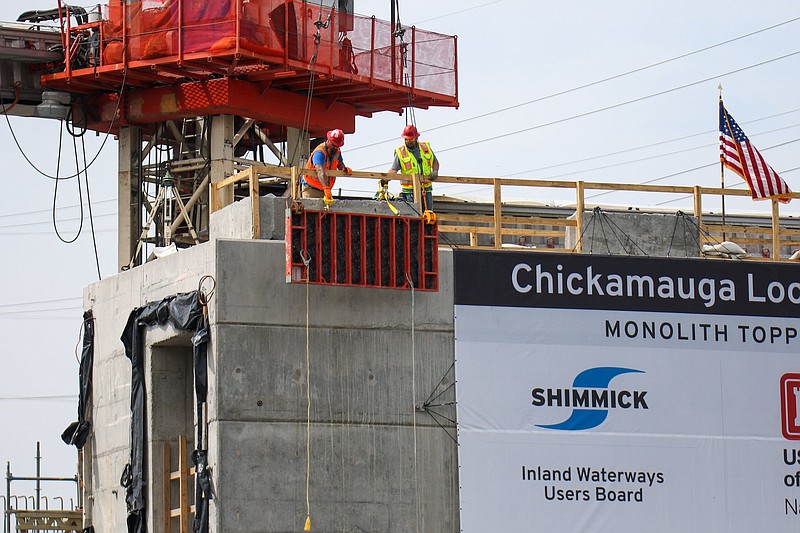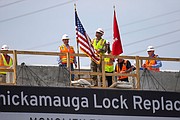While presiding at Monday's unveiling of the first concrete monolith at the new Chickamauga Lock, U.S. Army Lt. Col. Joe Sahl seasoned his history with a dash of self-effacing humor.
"The lock we're replacing was inaugurated in 1940 with President Franklin Delano Roosevelt in attendance," he said. "Today, you get me."
The monolith, 87 feet tall and made of enough concrete to support 150 homes, was formally completed Monday when a crane removed the final piece of formwork. Sahl, the Nashville District commander for the U.S. Army Corps of Engineers, called it a great achievement.
"This is a moment we've been waiting for a long time," he said. "It's a milestone for this project, one that couldn't be done without the work of more than 400 dedicated professionals," including those from contractor Shimmick Construction as well as the Corps.
(READ MORE: Costs of new Chickamauga Lock triple over time)
Army Capt. Joseph Cotton, project manager on the lock replacement, said the monolith is just the first of 36, but the next 35 should be put in place relatively quickly.
"I view it as proof-of-concept," he said. "It's rinse and repeat at this point, very repetitive. We're talking weeks for the next one, at most."
Built in the 1930s by the Tennessee Valley Authority, the existing lock measures 60 feet by 360 feet. Sahl said the fact that Roosevelt attended the lock's formal opening more than 80 years ago "speaks to the bright future the nation's leadership saw for Chattanooga, Knoxville and the many communities that directly derive benefits from the transportation enabled by this lock."
But time has taken its toll. The existing lock has sustained "concrete growth" in its chamber walls over the decades. As the new lock goes up next to it, the Corps is working to keep the old lock open to river traffic.
(READ MORE: Chattanooga's Chickamauga Lock project gets record funding)
Sahl said the new lock, 110 feet by 600 feet, will be able to accommodate nine barges per lockage, compared to the single barge the existing lock can handle. That difference could reduce commercial transit times by 80%, he said, adding that about 1 million tons of freight and more than 3,500 recreational boats pass through the lock each year.
Plans for a new lock developed nearly 20 years ago anticipated completion by 2020 at the latest and a price tag of less than $300 million, but work stopped more than a decade ago, delayed for years when Congress failed to appropriate enough money. The Corps estimated last month that the cost of replacing the lock has soared to more than $954 million. Sahl and Cotton said that the new lock should be operational sometime in 2026, with site remediation extending through 2028.
U.S. Rep. Chuck Fleischmann, R-Tenn., a member of the House Appropriations Committee who has long championed a new Chickamauga lock, did not attend Monday's event, but said in a statement that he is committed to efficient funding of the lock project.
(READ MORE: Concrete growth no threat to Chickamauga Dam safety, TVA says)
Sahl said the project "is not without its challenges — that's been well-publicized." At the same time, he added, it would be impossible to overstate "the importance of this lock to the continued growth of Chattanooga and the Tennessee Valley."
"Chickamauga Lock is part of an inland navigation system that provides a strategic advantage to the United States," he said. "Our inland water highways provide the cleanest, safest and most efficient way to move commerce and are a vital part of our multimodal transportation system."
Contact Bob Gary at bgary@timesfreepress.com or 423-757-6731.

